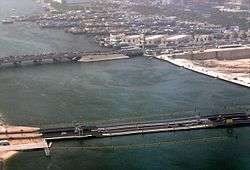Floating Bridge, Dubai
| Floating Bridge الجسر العائم | |
|---|---|
|
Aerial view of the floating bridge | |
| Coordinates | 25°14′56″N 55°19′33″E / 25.2489°N 55.3259°ECoordinates: 25°14′56″N 55°19′33″E / 25.2489°N 55.3259°E |
| Carries | Pedestrian and Vehicle |
| Locale | Dubai, United Arab Emirates |
| Characteristics | |
| Design | Pontoon bridge |
| Material | Concrete |
| Trough construction | Steel |
| Total length | 365 metres |
| Width | 22 metres |
| History | |
| Constructed by | Waagner biro Gulf |
| Construction cost | AED 155 million (42 million USD) |
| Inaugurated | 15 July 2007 |
| Opened | 16 July 2007 |
| Closed | Expected in 2017 |
Floating Bridge (Arabic: الجسر العائم) is a pontoon bridge (floating bridge) located in Dubai, United Arab Emirates. The bridge was built between Al Garhoud and Al Maktoum Bridges mainly to reduce traffic in Al Maktoum Bridge.[1] The bridge connects across the intersection near Deira City Centre and Dubai Creek Golf & Yacht Club, and ends at the intersection to the Riyadh Street, between Dubai Courts and the Creek Park.[1] The bridge opened on 16 July 2007 where the project cost 155 million dirhams to build and has the capacity of 6,000 vehicles an hour. The bridge also serve as an alternative route for Al Maktoum Bridge where Salik was recently implemented. The Floating Bridge is the fifth crossing on the Dubai Creek while the others are Al Shindagha Tunnel, Al Maktoum Bridge, Al Garhoud Bridge and Business Bay Crossing.

Construction
The Floating Bridge was one of the vision of Sheikh Mohammed bin Rashid Al Maktoum and the expertise of the Dubai Roads and Transport Authority (RTA).
Waagner biro Gulf[2] a subsidiary of Waagner-Biro Stahlbau AG was awarded the contract to construct the floating bridge. The bridge comprise with a total length of 365 metres and a width of 22 metres, the pontoon bridge features six lanes on two identical, mirrored decks spanning the entire Dubai Creek. For each direction an independent supporting structure has been constructed.
The parallel structures were designed to accommodate three lanes and one pedestrian footwalk each. Between the two floating pontoons made of concrete, each 115 metres long and 22 metres wide, a hydraulically driven rotating middle section made of steel is positioned to allow for undisturbed navigation. To compensate for differences in level as well as for transverse inclinations (heeling) and longitudinal displacements resulting from traffic loads and wave action acting on the ramp, another two rows of 28 transitory elements are installed between the floating pontoons and the transitory ramp on either bank.
The structure was formed dynamically distributed energy from waves and pressure from vehicles across the length and breadth of the platform in such a way that they canceled each other out. 23 standard elements filled with highly resistant polystyrene plates serve as the actual floating body supporting several thousands of tons of the heavy bridge on water level.The bridge was assembled in day and night shifts in the record time of only 23 days.[3] Altogether the time for design, foundation works,bank installations, as well as manufacture and installation of the steel structures added up to merely 10 months. The construction of floating bridge was completed with the cost of 155 million dirhams (42 million USD)[4] and on 15 July 2007 an inauguration ceremony was held to officially open the floating bridge.
Operation
The bridge, which is part of the Dubai Roads and Transport Authority's strategy to ease traffic congestion in the emirate, is designed to accommodate an estimated 3,000 vehicles in each direction during peak morning and evening hours and hence reduce congestion on Al Maktoum Bridge by around 37%.
The bridge has a fixed operation timings where it closes at night to open the partition of the bridge to allow boats and abras to pass through.
Replacement
The floating bridge is expected to be a temporary crossing. It was to be replaced by a new bridge called Dubai Smile by 2012,[5] but later Dubai RTA announced that the Floating bridge will be replaced by 12-lane Al Ittihad Bridge.[6] The construction of the Al Ittihad Bridge is expected to commence in late 2018. [7]
Image gallery
Construction of the Floating Bridge on 31 May 2007
References
- 1 2 http://gulfnews.com/news/uae/transport/floating-bridge-will-stay-till-2014-1.523942
- ↑ http://www.waagner-biro.com/en/divisions/gulf/about
- ↑ "Waagner Biro". Waagner Biro. Retrieved 18 December 2014.
- ↑ "Waagner Biro scores floating Creek bridge". Constructionweekonline.com. Retrieved 18 December 2014.
- ↑
- ↑ "Khaleejtimes Link". Khaleej Times. Retrieved 9 February 2014.
- ↑ http://www.emirates247.com/news/emirates/dubai-s-al-ittihad-bridge-to-be-ready-by-early-2018-2014-07-22-1.557313
External links
| Wikimedia Commons has media related to Floating Bridge, Dubai. |
- Floating bridge over Dubai Creek opens Gulf News (16 July 2007)
- Pontoon will ease Maktoum bridge traffic Gulf News (17 July 2007)
- Floating bridge completed in just 300 days Gulf News (20 July 2007)





